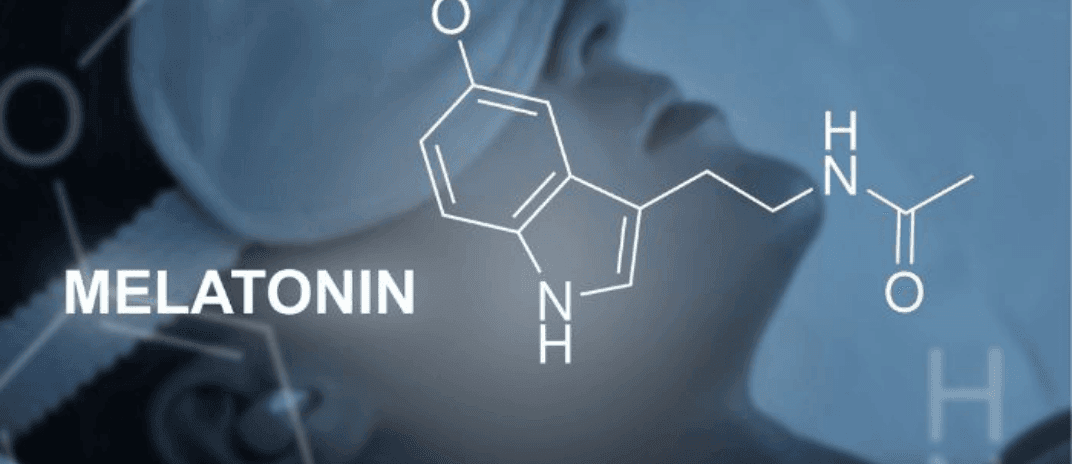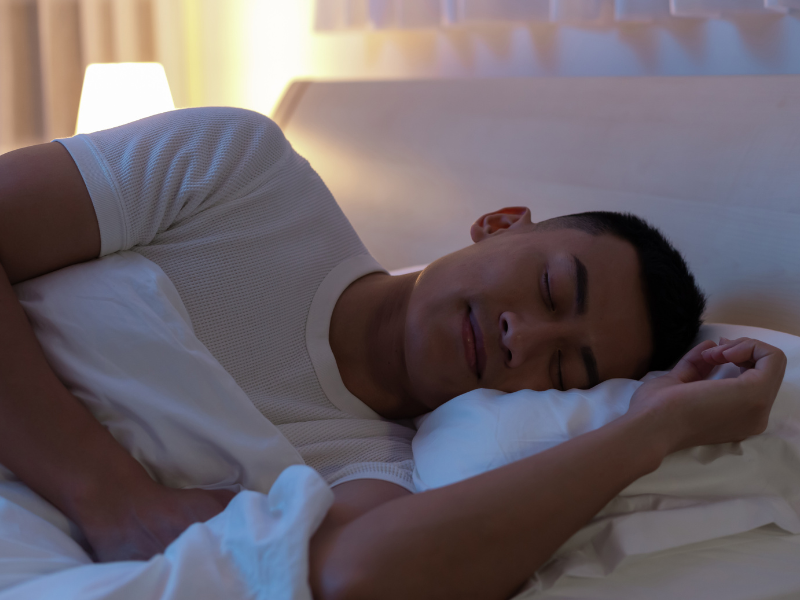


More than two years after the World Health Organization (WHO) declared the status of COVID-19 as a global pandemic, this infectious disease continues to circulate in the US and worldwide. It infection can cause a range of symptoms including fever, cough, and shortness of breath. Furthermore, some infected patients experience severe health complications and long-lasting medical issues, such as insomnia, other sleep-related issues, and psychological problems.
People may wonder if taking melatonin supplements can prevent COVID-19 infection or reduce sleep-related symptoms. In other words, can melatonin work as a potential silver bullet in treating COVID-19 patients? Some current research studies are exploring the possibilities of finding a correlation between melatonin and the body’s response to viral infections like COVID-19.

Here we’ll provide an overview of melatonin and its correlation between sleep patterns and immunity, and discuss serial results from research into melatonin use in COVID-19 infection.
Melatonin is an endocrine molecule secreted by the pineal gland. Moreover, it is synthesized in mitochondria throughout the body. The tissue melatonin is manifold greater in quantity than melatonin from the pineal gland. Apart from its customary role in sleep and circadian rhythm regulations, it is also an anti-inflammatory, antioxidant, and immunomodulatory agent. Besides these properties, it is a cost-effective antiviral substance with minor side effects.It is a potential adjuvant in treating COVID-19. According to research, our brain can release the melatonin and makes us sleepy. It has to do with circadian rhythms, the internal process that helps people fall asleep at night and wake up during the day.

While brain naturally produces melatonin, it is also traded over the counter as a dietary supplement in the US. However, melatonin is only available with a prescription in the European Union (EU) and some other countries.
Melatonin supplements may help individuals’ sleep with jet lag, insomnia, or other sleep disorders. Studies have found that taking melatonin at bedtime helps people suffering from jet lag feel more alert during the day and adjust to their new time zone more conveniently. In addition, melatonin may help individuals with insomnia fall asleep quicker and longer.
Sleep is integral to maintaining a healthy immune system.It will help keep cortisol levels and the sympathetic nervous system in balance. Cortisol, is the stress hormone and it has many effects on the body, such as reducing inflammation. Similarly, the sympathetic nervous system impacts our immune system and other body operations.
It is a well-studied topic that sleep deprivation wanes the immune system in multiple ways. Some researchers have found that people have lower levels of natural killer (NK) cells after losing a substantial amount of sleep. The existing NK cells are less able to fight disease NK cells.These are white blood cells , they kill cells infected with viruses and other germs. People with low levels of functional NK cells are at high risk of viral infection.

Furthermore, people with sleep deprivation have higher levels of cytokines, which are body proteins encouraging inflammation. In the case of COVID-19 patients, research studies have concluded that their high levels of cytokines have been directly associated with worse health outcomes.In fact, some people with COVID-19 develop an unusually strong and potentially life-threatening condition involving inflammation with high levels of cytokines and high fevers, called a cytokine storm.
Available research suggests that sleep-deprived people may have a higher infection risk. For instance, these people develop fewer antibodies in response to the influenza vaccine than fully-rested people. In addition, people with less than seven hours of sleep are more vulnerable to the common cold after exposure to a cold-causing virus.
Current standardized guidelines for treating COVID-19 do not include the use of melatonin. However, some experts have recommended that melatonin could provide a supportive treatment for COVID-19 patients. According to these experts, melatonin does not directly kill or weaken the virus causing COVID-19, but it might address some of the virus’s effects on the body.
Many people face sleep difficulties after recovering from COVID-19. For example, up to 1/4th of patients hospitalized with COVID-19 may still encounter sleep disturbances six months after hospitalization. As melatonin may be used to treat insomnia, people with lingering sleep troubles after recovering from the COVID-19 infection can discuss the use of melatonin with their physicians.
Melatonin effects people’s sleep and reduces inflammation. Consequently, some experts deduce that melatonin could diminish cytokine storm occurring in extreme COVID-19 cases. Moreover, melatonin also has antioxidant effects that may prevent damage to cells and help vital organs like hearts and lungs to heal after an injury.

There are currently a few high-quality studies of the effectiveness of melatonin as a treatment for COVID-19. Many studies suggest that COVID-19 patients provided melatonin apart from the standard COVID-19 treatment. The melatonin could recover more quickly, had fewer blood clots, and might have been less vulnerable to death than those with standard treatment alone. In addition, many animal studies have also found that melatonin reduces the severity of several viral infections.
While these studies are promising, additional research is required to evaluate the safety and efficacy of melatonin for treating COVID-19. Until then, COVID-19 patients should not take melatonin as a treatment without first speaking with their physicians. Furthermore, melatonin should not be taken in place of medications prescribed by a doctor.
The several clinical trials have proved that the melatonin’s efficacy at various doses, ranging from 2 mg to 500 mg daily, given to patients with severe COVID-19. Earlier studies failed to show any toxicity due to melatonin, even at the highest doses. Moreover, melatonin was predicted to be most likely to control COVID-19 infection.
The scope of the study is only limited to older adults. Therefore, future trials should include children and other age groups over a wide age spectrum to enhance the generalizability of these outcomes. Once these key facts of melatonin treatment are resolved, its supplementation could help safeguard cells and mitochondria against inflammatory damage.
The current research indicates that melatonin has at least twice the efficacy of remdesivir or tocilizumab in reducing inflammatory markers in COVID-19 patients. Therefore, both these medicines are being used under certain clinical constraints to treat COVID-19, though they have produced significant adverse reactions and must be given intravenously. In contrast, melatonin can be given orally and by any other route without causing known toxicity.

In the current scenario, the vaccine resistance is intensifying and vaccine distribution to remote global regions is limited, melatonin used independently or with vaccines/antivirals could be part of the solution to this problem.
Clinically, melatonin treatment reduces the severity of COVID-19 infections by lowering the impact of symptoms. It reduces the hospitalization needs (i.e., controlling healthcare exhaustion), reducing the duration of hospital stay when necessary, and eliminating the requirements for mechanical intubation, and reducing the mortality rates.
The COVID-19 pandemic is one of the most devastating events in modern history. Although coronavirus inflicts relatively minor damage to young and healthy populations, it imposes life-threatening danger to the elderly and patients suffering from chronic inflammatory diseases. Therefore, reducing the risk for vulnerable groups would make COVID-19 similar to many common outbreaks. It has been observed that children do not suffer from COVID-19 like their grandparents, who have a much higher melatonin level.

Many studies have reported that viruses induce an explosion of inflammatory cytokines and reactive oxygen species, and melatonin is the best natural antioxidant, usually lost with growing age. The coronavirus causes death to the programmed cells, which can result in significant lung damage, also inhibited by melatonin.Furthermore, it creates lung inflammation that requires inflammasome activity, Melatonin blocks these inflammasomes. The general immunity is impaired by anxiety and sleep deprivation, some clinical trials have demonstrated that melatonin improves sleep habits, reduces anxiety , and stimulates immunity. Fibrosis may be the most threatening complication after contracting COVID-19 disease, melatonin is known to prevent fibrosis. Mechanical ventilation may be compulsory but yet imposes risks due to oxidative stress, which can be reduced by melatonin.Thus, using the safe over-the-counter melatonin drug may promptly avert the development of severe disease symptoms in coronavirus patients, reduce the severity of their symptoms, and/or reduce the immuno-pathology of infection on patients’ health after the active disease phase.
You might also like:
9 Best Foods to Eat Before Bed | Foods with Melatonin
COVID-19 Has Altered Our Dream Worlds
Sleep Transitions in Children and Adolescents during COVID-19
Candeloro, D., & Volĕiĕ, A. (2002). Radon-Nikodým Theorems. In Elsevier eBooks (pp. 249–294). https://doi.org/10.1016/b978-044450263-6/50007-5
Pradhan, R. K., Vinnakota, K. C., Beard, D. A., & Dash, R. K. (2013). Carrier-Mediated transport through biomembranes. In Elsevier eBooks (pp. 181–212). https://doi.org/10.1016/b978-0-12-415824-5.00005-9
Reiter, R. J. (2004). Pineal Gland. In Elsevier eBooks (pp. 604–608). https://doi.org/10.1016/b0-12-475570-4/01018-0
Suni, E., & Suni, E. (2023, August 15). How sleep affects immunity. Sleep Foundation. https://www.sleepfoundation.org/physical-health/how-sleep-affects-immunity
Suni, E., & Suni, E. (2023, November 16). Stress and insomnia. Sleep Foundation. https://www.sleepfoundation.org/insomnia/stress-and-insomnia
Wyatt, J. K., & Cvengros, J. A. (2012). Delayed and advanced sleep phase disorders. In Elsevier eBooks (pp. 402–410). https://doi.org/10.1016/b978-1-4377-1703-7.10031-3